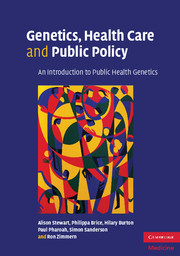1 - Introduction
Published online by Cambridge University Press: 19 January 2010
Summary
Public health genetics is a new discipline. It brings together the insights of genetic and molecular science as a means of preventing disease and of protecting and improving the health of the population. Its scope is wide, and requires an understanding of genetics, epidemiology, public health, the principles of ethics, law and the social sciences and much else besides.
At the core of public health genetics is the notion that genes, like the classic environmental factors that have been shown over many decades to be causally implicated in disease, are themselves important determinants of health; and that they play as important a role as exposures to physical and biological agents or to social and structural factors such as poverty and unemployment. But, as with environmental determinants, genes act not on their own but in combination with other factors. Every gene interacts with others in the genome and with a host of external exposures to produce the full range of human characteristics. The complexities of these relationships mean that, while genetic factors are at work in all diseases, no single genetic variant (except in the case of relatively rare ‘genetic diseases’, discussed further below) will be predictive of when or whether disease will strike, or of its severity.
The health and social policy issues that form much of the practice of public health genetics are equally complex, including legal and regulatory frameworks in genetic testing; science funding and policy; consent, confidentiality and data protection; the pharmaceutical and biotechnology industries; the patenting of genes and genetic sequences; and the education and training of health professionals and of the public in the implications of genetic science.
- Type
- Chapter
- Information
- Genetics, Health Care and Public PolicyAn Introduction to Public Health Genetics, pp. 1 - 22Publisher: Cambridge University PressPrint publication year: 2007
- 4
- Cited by



